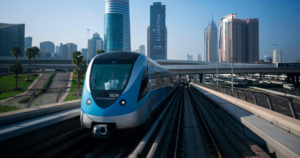Commuters in Dubai can breathe a sigh of relief as three Dubai Metro stations impacted by April’s record-breaking storm have reopened. The Roads and Transport Authority (RTA) announced the reopening of Equiti, Mashreq, and ONPASSIVE stations on the Dubai Metro Red Line on Sunday, May 19th.

Dubai Metro After April Strom
The April storm caused significant flooding across Dubai, including several Dubai Metro stations. Equiti, Energy, Al Mashreq, and ONPASSIVE were all forced to close, disrupting travel plans for many residents.
While repairs continued, the RTA deployed a network of 150 buses to ferry passengers between specific stations. These included Business Bay to ONPASSIVE, Mall of the Emirates, Mashreq, Equiti, Dubai Internet City, and Al Khail.
The RTA also implemented a series of express buses to connect the closed stations with the operational network. All express buses departed from Business Bay station, offering three distinct routes:
- Route 1: Business Bay to ONPASSIVE station
- Route 2: Business Bay to Mall of the Emirates, Mashreq, and Equiti stations
- Route 3: Business Bay to Al Khail and Dubai Internet City station (and vice versa)
These temporary measures ensured continued mobility for commuters during the station closures. The RTA strategically positioned the express buses at Exit 2 of Business Bay station to minimize passenger wait times.
However, with the reopening of Equiti, Mashreq, and ONPASSIVE stations, the need for these temporary bus services is expected to diminish. The RTA has confirmed that the Energy Dubai Metro station is still undergoing repairs and is expected to reopen sometime next week.
The reopening of these stations marks a significant step towards normalcy for Dubai’s public transportation system. The RTA has assured commuters that all necessary maintenance and testing have been completed to ensure the stations are fully operational and meet all safety requirements.
While the storm caused disruption, the RTA’s swift response in deploying alternative transportation options helped mitigate the impact on commuters. This highlights the importance of robust contingency plans for public transportation infrastructure, especially in regions prone to extreme weather events.


